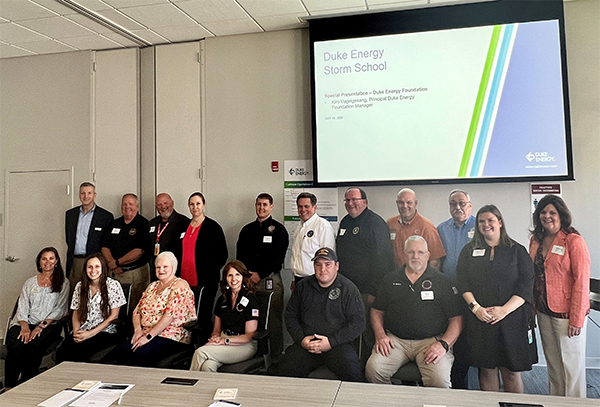First responders, including representatives from local police, fire and emergency management agencies (EMA) throughout southwest Ohio and Northern Kentucky, attended Duke Energy Storm School, an interactive training session on the company’s preparation for and response to severe weather. At the beginning of the program, each EMA was awarded a $5,000 Duke Energy Foundation grant, for a total of $55,000.
“Preparing communities to respond to severe weather impacts takes all of us,” said Amy Spiller, president of Duke Energy Ohio and Kentucky. “Together with our fellow first responders, we are committed to keeping our region resilient. These grants will help provide our partners with the tools and training to handle whatever Mother Nature throws our way.”
Approximately 30 EMA and first responders learned from Duke Energy experts in meteorology, storm preparation and restoration, and grid resiliency to gain an understanding of how the company makes decisions and works collaboratively to safely and quickly restore power after a storm.
“Duke Energy is a crucial and close partner of the Hamilton County EMA,” said Director Nick Crossley. “We appreciate this generous donation and, more importantly learning more about their detailed response plans before, during and after severe weather impacts our communities.”
As the spring and summer storm season approaches, Duke Energy urges customers to be prepared. Create (or update) an emergency supply kit to save valuable time later. The kit should include everything an individual or family would need for at least two weeks, especially medicines, water, nonperrishable foods and other supplies that might be hard to find after a storm hits.
• Keep a portable radio or TV or a NOAA weather radio on hand to monitor weather forecasts and important information from state and local officials.
• Charge cellphones, computers and other electronic devices in advance of storms to stay connected to important safety and response information. Consider purchasing portable chargers and make sure they are fully charged as well.
• Pet owners should arrange to stay at evacuation shelters that accept pets; friends’ or family members’ homes; or pet-friendly hotels.
For full information on being prepared before, during and after a storm hits, visit www.duke-energy.com.
Duke Energy



















